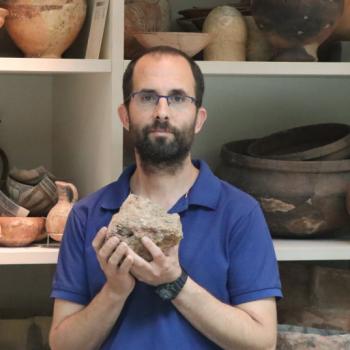. . . and Christian Epistemology
This exchange took place on atheist anti-theist Bob Seidensticker’s blog, under his article entitled, “Christians weaponizing scholars’ quotes: Sherwin-White, Russell, and Vilenkin” (2-14-22). Words of atheist “ericc” will be in blue.
Seidensticker wrote in the article above: “Christians quoting atheists can be legitimately done. They just need to follow the basic rules of research that one might learn in eight grade: a quote can be used only if it’s accurately quoted, correctly understood, excerpted in its context, and cited accurately. You’re welcome to hold me to these standards, because you know I will be doing that to the Christian apologists.”
One example of an “atheist” historian being supposedly misquoted by Christians that he gave was historian A. N. Sherwin-White.
*****
I cited Sherwin-White accurately in a recent article:
[T]he confirmation of historicity [in Acts] is overwhelming . . . any attempt to reject its historicity even in matters of detail must now appear absurd. Roman historians have long taken it for granted. (Roman Society and Roman Law in the New Testament, Oxford University Press, 1963, 173)
See the quotation in context at Google Books.
He also analyzed Luke’s references to 32 countries, 54 cities and nine islands, and couldn’t find a single error. Assuming, then, that he was an agnostic or atheist, that’s an extraordinary support for not only the accuracy of Luke, but a minute, compelling historical trustworthiness characteristic of the very best ancient historians.
If I write something that accurately references 32 countries, 54 cities, and 9 islands, in which I flap my arms and fly between them, would you believe based on the accuracy of my place references that I flapped my arms and flew between them?
It’s possible to separate the two things, just as atheists accept historical accounts written by Herodotus and Josephus: both of whom included many supernatural elements. They only get “conveniently skeptical” when it comes to the Bible. The archaeological evidences and the accuracy are what they are.
I am not understanding how we non-believers are ‘only conveniently skeptical’ (implied by your message: of the bible. As in, we are treating it more skeptically than we would other texts.)
We treat Herodotus’ Greek divine actions, and the Koran’s divine actions, and miraculous acts described in the Gandhāran Buddhist texts the same way. As do you.
So it seems to me you’ve got the situation completely reversed here. First, we non-believers aren’t treating the bible any differently than we are any other texts: in all cases, we act consistently in ‘separating the two things’ i.e. the mundane details from the extraordinary claims. Second, you theists also separate the two things. But where we are consistent in doing so, you are not. You separate the two things when it comes to everyone else’s beliefs. It is only in the case of the NT where you would accept the logic that accurate place names is reason to believe in the recorded miracles. In no other case, for no other book, would you accept such logic.
I’m talking about how atheists routinely assume that the Gospel writers are inaccurate, and (beyond that) deliberate liars. The text and the external evidences provide no compelling reason to believe those things. It’s only atheist pre-existing bias that causes such skepticism. That is my point. I basically agree with the point you make above, but it doesn’t address my central point.
Sherwin-Wine is a true, objective scholar. He can acknowledge if a source is historically accurate regardless of whether it contains supernatural elements or not, or whether he himself is a Christian or not. He bows to the actual objective evidence. May his tribe greatly multiply!
My point regarding miracles is a bit different from how you characterize it. I would say that demonstrated historical accuracy gives us no reason to believe that Luke is deliberately making up miracle-stories for the sake of a nefarious agenda. In other words, the two things together strongly suggest that he sincerely believes that such miracles occurred.
That’s epistemologically distinct from the basis of believing in the miracles. In a nutshell, the Christian reasoning there would run as follows:
1. Jesus claimed to be God in the flesh. We have sufficient reason to know that He made the claims because historically trustworthy amateur historians like Luke and John said so.
2. Among His acts performed were miracles, including His own Resurrection. We believe that those things happened based on the accuracy of the writers and in faith (not with absolute proof) because He claimed to be God and this is what we would expect of God, since God (if He exists) would and indeed does perform miracles, as He sees fit. In other words, it’s plausible from within a dualist, theist, Judaeo-Christian worldview. Jesus talked like we imagine God would talk, based on what we know, and acted likewise.
3. I argue as an apologist for the archaeologically verified accuracy of biblical accounts because that knocks out a relentless objection from atheists: that the text is inaccurate; therefore can’t possibly be inspired revelation.
4. If the apologist like myself takes out that objection by showing again and again that the documents are accurate and trustworthy, then we show that the nature of the biblical books are consistent with the notion of being inspired (thus that it is not impossible that they are). That’s not the same as proving inspiration. Repeat: That’s not the same as proving inspiration. But it is well worth doing, to counter atheist misrepresentation of the nature of the biblical texts; to “defeat the defeater”.
Likewise, when Jonathan MS Pearce invents a fairy tale out of his head, that Matthew completely made up the guards at the tomb story, it does not become the case that there is any historical evidence for same, simply because he asserts it. [see also my reply to his “reply” on this issue).
But I could convince no atheist (from the looks of it) of this when I made that unarguable point of critique a little while ago. He thinks that simply because it is possible for something to happen, therefore it did, and should be stated with a straight face as a [choke] “fact.”
This is not just John Smith, atheist. He’s one of the most influential online atheists, and an author, etc.
The reason you can’t convince people is because it’s an utterly inapt comparison. One is an account of the past. the other is a hypothesis explaining why the account says what it says.
But we can use the JP example as a reductio analysis of your logic. JP could easily add tons of accurate references to places and people of 1st century AD to his explanation of what the (author of) Matthew did. Would the accuracy of his other details have any weight in your evaluation of his argument? No it wouldn’t, right?
You’re still not getting it. I have explained my outlook at length. Jonathan has no historical E-V-I-D-E-N-C-E whatsoever for his story about Matthew making up a story. Thus, it’s epistemologically no better than a fairy-tale. But when I said that, he irrationally took it as a personal attack. Nope. It is an argument about epistemology and how he “knows” what he claims to know.
No one will touch this critique. All they do is say I was attacking him personally (absolutely untrue), or change the subject.
***
Practical Matters: Perhaps some of my 4,000+ free online articles (the most comprehensive “one-stop” Catholic apologetics site) or fifty books have helped you (by God’s grace) to decide to become Catholic or to return to the Church, or better understand some doctrines and why we believe them.
Or you may believe my work is worthy to support for the purpose of apologetics and evangelism in general. If so, please seriously consider a much-needed financial contribution. I’m always in need of more funds: especially monthly support. “The laborer is worthy of his wages” (1 Tim 5:18, NKJV). 1 December 2021 was my 20th anniversary as a full-time Catholic apologist, and February 2022 marked the 25th anniversary of my blog.
PayPal donations are the easiest: just send to my email address: [email protected]. You’ll see the term “Catholic Used Book Service”, which is my old side-business. To learn about the different methods of contributing, including 100% tax deduction, etc., see my page: About Catholic Apologist Dave Armstrong / Donation Information. Thanks a million from the bottom of my heart!
***
Photo credit: Image by “Mary1826” (January 2017) [Pixabay / CC0 Creative Commons license]
***
Summary: Atheist “skepticism re the Gospels” is an intransigent thing that can’t be overcome, no matter how many “external” arguments from archaeology we provide.














